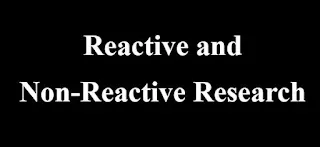Reactive and Non-Reactive Research
1- Non-reactive
Research
In non-reactive
research People who are being studied are not aware of fact that they are being
studied by researcher. Examples of non-reactive researches are Quantitative and
observational studies.
2- Reactive
Research
In reactive
research People knows they are being studied by researcher. Examples of
reactive researches are Experiments and surveys.
1.1-
Why Researchers use Non-Reactive Research
Researchers use
non-reactive research to collect accurate and original data that is non-suspicious
in all manners. Through non-reactive research approach researcher can record or
observe original behavior or actions of people. Researcher did not disturb
people while collecting data.
1.2-
Type of Non-Reactive Research “Content
Analysis”
Content Analysis
is widely used for gathering and analyzing the text. content means all written
on pictorial data about a researchable thing for example; words, meanings, images,
signs, ideas, themes, or anything that tells about the problem or thing.
1.3-
Source of information for content
analysis
Sources of content analysis includes
all type of documents for example Personal, Non-personal, Mass media, Books, publications,
journals, literatures, announcements, billboards, ads, snapshots, articles etc.
Researcher codes the data carefully, makes themes, sub themes and headings to
analyses the content.
Content
analysis is non-reactive research method. In content analysis no interaction occurs
between the researcher and the text writer. Researcher did not disturb the sample.
1.4-
How to do content analysis?
Researchers makes
Question about problem. Studies the variables on which he is going to do
analysis. Researcher decides about Sampling procedure and selects sample from population.
Here Population and sample means words, sentences, paragraphs in documents researchers
selects the sample randomly.
Researcher Observes the tone of written
text either it was positive or negative. Where it leads, did he had collected
enough amount of data. Is it worthwhile. Is it seems original or fake. Researcher
codes the data makes categories and gives labels to each category.
Checks how many times the data is related to one category. Which category have
more data. Checks the reliability and
the validity of data.
How to conduct Interviews?
Usually researcher conducts the interviews.
If researcher did not conduct interviews he can take help from a field worker.
Who is field worker?
A field worker is a person who
collects data in the field for researcher. A researcher can take help of field
worker for conducting telephonic interviews, for an observation of a group of
people, for administration of questionnaires for data collection and for one on
one interviews of participants.
Who are Interviewers?
Interviewers are people hired by
the researcher for data collection. The researcher can contact any Interviewing
Service for conducting interviews. Theses service providers have individuals who
specializes in gathering data, edit questionnaires and analyzing the collected
data.
Responsibilities of Interviewer:
He should take permission from
participants first. He must know how to introduce himself. He should have
ability to convince the participant. If he is taking a telephonic interview he
should know how to talk to participants.
He should do a
rehearsal before conducting interviews to learn how to ask the questions from respondents.
He should know which questions are important and necessary to be answered. He
should repeat questions if the respondents feel difficulty in understanding
them. He should not record interviews without respondent’s permission. If there
are closed ended questions interviewer, make it sure all questions are answered
by respondent. Interviewer should not manipulate the answers by summarizing and
paraphrasing them. The data should present original ideas of respondents.
Researcher should show gratitude to the participants at the end of interviews.
1- Inductive
Approach to Research
Researchers use
inductive approach to research in order to develop a new theory. Deductive
approach to research always proceeds and starts from a question. It always explores
a new idea and investigates previously researched theory from a different perception.
It is widely used in qualitative research. Glaser and Strauss grounded theory
is an example of inductive approach. The starts theory building process with an
open mind without any preexisting belief and thought and develops a new theory
based on study results.
2- Deductive
Approach to Research
Researchers use deductive
approach to research in order to test a theory. Deductive approach to research
always have a hypothesis. Its focus is always on a cause. It is widely used in
quantitative research.
3- Suggested
Readings
1. Feeney,
A., & Heit, E. (Eds.). (2007). Inductive reasoning: Experimental,
developmental, and computational approaches. Cambridge University Press.
2. Hodkinson,
P. (2008). Grounded theory and inductive research.
3. Hyde,
K. F. (2000). Recognizing deductive processes in qualitative
research. Qualitative market research: An international
journal, 3(2), 82-90.
4. Soiferman,
L. K. (2010). Compare and Contrast Inductive and Deductive Research
Approaches. Online Submission.


.jpg)

.jpeg)


0 Comments